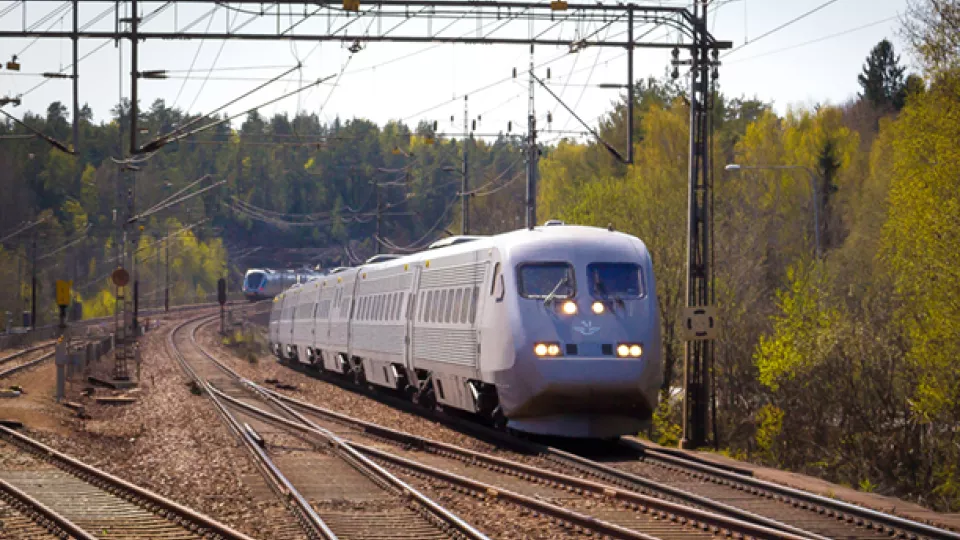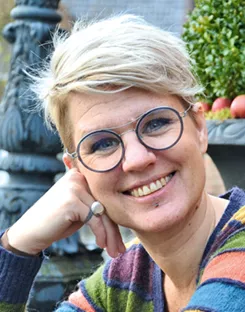The Swedish Environmental Protection Agency’s data on universities’ emissions from travel shows the climate footprint from LU’s flights has reduced a little in the past three years (see fact box)
The current proposed travel policy has been circulated in the organisation and, as expected, the responses have been disparate. Some organisational units want to introduce a flight ban on flights to Stockholm and train travel as the standard in North West Europe. Other organisational units cannot see how they would be able to do their jobs with fewer flights. Now the travel policy will be discussed by the vice-chancellor’s management council and the University Board in December/January and, if it doesn’t run into opposition – approved.
“The new travel policy, if it is approved, is clearer about managers having to consider the environment before approving travel for their employees”, says policy officer Linda Petersson, author of the draft travel policy.Managers are also expected to set a good example when it comes to their own travel. At the same time, the new travel policy avoids being strict, environmental consideration must be given, but travel must also be cost effective. When it comes to train travel further down in Europe it is difficult to have the cake and eat it too. Expenses and overnight stays often make train travel more expensive than flying and this new policy does not provide clear instructions on which should carry more weight. On the other hand, the travel policy includes a time limit detailing how much time an employee has to gain, door to door, to be able to choose the option of flying.
“If an employee is travelling in Sweden they must travel by train unless the time gained by flying is more than two hours on both the outbound and return journeys”, says Linda Petersson.
This means trips to Stockholm are in a grey area and Lund University is less strict than the City of Malmö which lists three hours gained as their minimum. The City of Lund, the Skåne County Administrative Board, and Region Skåne do not provide a time limit but state in their respective policies that trips to Stockholm are generally to be made via train and not via flights, even if these are more expensive (e.g. a private compartment if an overnight train is chosen) and take longer.
Lennart Olsson, professor of geography, together with 18 other researchers, recently wrote an appeal published in the opinion section of the Swedish daily newspaper, Dagens Nyheter (DN), where Swedish universities were challenged to practise what they preach and halve their greenhouse gas emissions, among other things by reducing travel. He has two concrete suggestions.
“Investments are needed in a central and well-functioning video conference system, something which was raised in the University’s report ‘Travel-free meetings’ (in Swedish) released earlier this year”, says Lennart Olsson and adds that our procured travel agency could be instructed to offer train trips to Stockholm as standard procedure.”
Simplifying the process for those who wish to replace travel with video conferences is also viewed as an issue of priority by LU’s management.
Both Lennart Olsson and Mats Alvesson, who was also behind the appeal in DN which has now been signed by 700 researchers, say Lund University has good intentions and is investing in the right things in its environmental action plan – where a reduction in flights is a goal. However, it is going far too slowly.
“Something we can do when it comes to flights, for example, is to introduce an internal flight tax, as they have done at the University of Gothenburg and Kristianstad University. In Kristianstad, for every tonne of carbon dioxide released the cost is SEK 100, money which is directed to sustainability projects.”
It is also clear that the Public Procurement Act must be abided by – even if you find the world’s cheapest train trip from a supplier other than the procured travel agency you are not permitted to purchase it. To increase interest in taking the train, the instructions are that if the train trip is longer than an hour it is recommended you travel in first class, although manager’s approval is still required for this.
“If you travel on an overnight train, within Sweden or abroad, the right to a private compartment is proposed. The cost for overnight trains must be compared with an extra night’s accommodation and the calculated time saved”, says Linda Petersson.
Our procured travel agency Egencia is criticised by environmentally-friendly researchers who wish to take the train to Europe for booking expensive and complicated trips. Procurement officer Evelina Kelvgård, who is responsible for the agreement with Egencia, says there is ongoing dialogue between them where the collaboration is continually assessed and that complaints provide important input for improvements. However, above all, it relates to a wider industry problem.
“There is no combined booking system for international train trips which makes it harder to book trains than flights”, says Evelina Kelvgård and adds that the Expedia Group to which Egencia belongs, has acquired a company to specifically focus more on train travel and to be able to combine several European systems in order to facilitate international train bookings.”
However, the Head of Procurement at LU, Jeanette Jakobsson, says that Egencia is at the forefront when it comes to sustainability work amid the few large companies that have the capacity to service Lund University’s travel demands.
“We understand the criticism and agree the possibility to book train travel is neglected compared to booking flights. Our possibilities to book international trains are currently the same as for other corporate travel agencies since we work in the same external booking systems which do not allow access to all types of local tickets and promotions”, says Kristina Zdrilic Siljedahl, client manager at Egencia.
Egencia recently organised an educational event in Malmö on the theme “Sustainable travel”. Different solutions were presented for Lund University, among others, in regard to how the booking system could be programmed to be directed toward a more sustainable way to travel. It may involve directing away from flights toward train travel, or extending the train trip to Stockholm to include a ticket to travel on the underground as part of the same ticket. Egencia can also provide environment reports on CO2 emissions by department – and at the LU-wide level – something which is already used by the University.
Footnote: The EU parliament also agrees that train travel in Europe needs to be simplified and recently made a decision to promote the issue.



